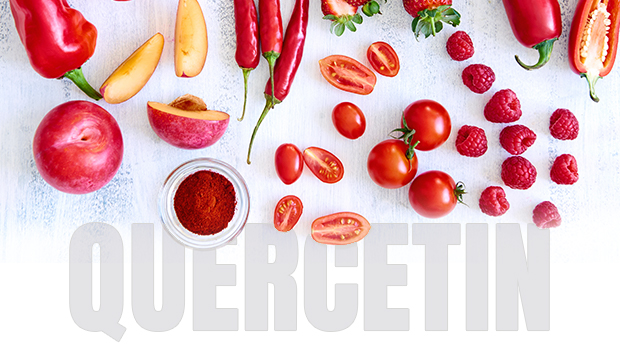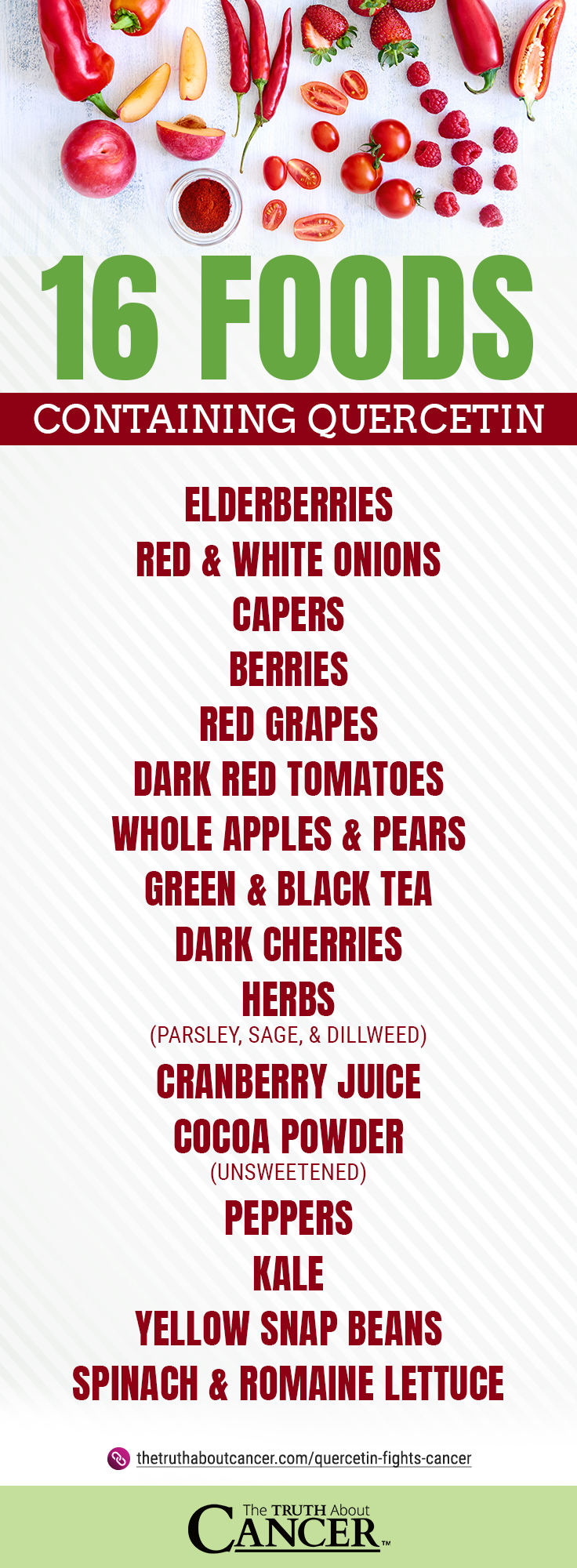Oxidative stress is a condition characterized by free radical damage within the body that causes cellular instability and chronic inflammation. This state of high oxidative stress is a major player in the formation of cancer cells and other chronic disease states. Controlling oxidative stress with dietary antioxidants is a key strategy to prevent disease and optimize quality of life. Quercetin is a unique antioxidant that has been shown to have a profound effect on reducing oxidative stress and preventing and reversing cancer cell development.
Quercetin is a flavonoid phytonutrient that makes up many of the color ranges in fruits and vegetables.1 Flavonoids such as quercetin are very important antioxidants that quench oxidative stress, reduce inflammation, and protect the body from the development of chronic disease and cancer.
How Do Antioxidants Such as Quercetin Protect the Body From Damage?
Free radicals are atom compounds that are starving for electrons and will do whatever it takes to steal an electron from other more stable atoms. Antioxidants have an extra electron and are able to donate this spare electron from their outer atomic ring to a free radical, creating a stable compound.
Quercetin, in particular, has a very low reactivity rate and has a strong desire to donate its spare electron to protect the body. This is similar to a peaceful child who freely gives up one of his or her own toys in order to satisfy the demands of another child who is throwing a fit because he wants a toy. Because of this act, the classroom of children remains calm and is able to avoid or reduce a major disturbance or quiet down a disturbance that had started.
As a result of its generous ability to share, quercetin has not only been characterized as an antioxidant, but also has anti-cancer and anti-inflammatory properties which provide health benefits.
16 Quercetin Foods: Getting More Quercetin in Your Diet
Quercetin is found in many high-quality foods that most people have ready access to, including these 16 foods:2,3
- Elderberries (best source)
- Red and white onions
- Capers
- Berries including cranberries, blueberries, raspberries, and blackberries
- Red grapes
- Tomatoes (the darker the red, the higher the concentration)
- Apples and pears (only if you eat the nutrient-dense peel)
- Green and black tea
- Dark cherries
- Herbs such as parsley, sage, and dillweed
- Red wine and cranberry juice
- Unsweetened cocoa powder
- A variety of peppers including ancho, serrano, and hot green and yellow peppers
- Kale
- Yellow snap beans
- Spinach and Romaine Lettuce
How Quercetin Helps With Side Effects of Chemo & Radiation
Cancer is one of the fastest growing chronic diseases today and there is very little in the conventional cancer treatment world that deals with antioxidants and oxidative stress. Most cancer treatments such as chemotherapy and radiation also damage the nervous system and have common side effects such as peripheral neuropathy, headaches, and chronic pain.
Some studies have demonstrated that quercetin can help reduce this neuropathic damage and the unwanted side effects that come with it.4 Quercetin and its flavonoid partner rutin synergize to protect neurons in the dorsal horn of the spinal cord that play a role in sensory information and pain perception.
The Health Benefits of Quercetin Include Cancer-Fighting Properties
Other quercetin benefits include anti-carcinogenic properties that may prevent the development of certain cancers. Researchers are becoming increasingly aware of the role of flavonoids in the treatment of cancer tumor growths. Quercetin treatment may be a possible therapeutic agent in a treatment protocol for the following cancers:
-
-
- Leukemia: Quercetin has been shown to inhibit leukemic T-cells from progressing in humans by stopping the phase of the cell cycle in which the cancer would be able to duplicate itself.3
- Lung Cancer: In one study, the combination of both apple and onion intake was associated with the reduction of lung cancer by up to 50 percent in men and women.3,5
- Breast Cancer: The anti-cancer properties of quercetin are believed to be a result of several cancer fighting capabilities. Quercetin may suppress the activity of the mutant P53 gene common in breast cancer, which is also responsible for the progression of tumor growth.3,6
- Neuroblastoma: Developing nerve cells can become cancerous in children and infants. Quercetin may prevent toxins from creating oxidative damage to these cells during development which can lead to neuroblastoma.2
- Colon Carcinoma: High dosage amounts of quercetin have also been shown to limit the cancer cell’s ability to proliferate in the large intestine and cause colon carcinoma.3
- Ovarian Cancer: A specific nutrient mixture containing quercetin and other nutrients was found to significantly suppress ovarian tumor incidence and growth and lung metastasis.8
- Endometrial Cancer: Quercetin and isoflavone intake has been associated with a reduced risk of endometrial cancer.9
-
Is a Quercetin Supplement Right for You?
Research has shown that only 30-50 percent of ingested food-based quercetin is able to make it through the digestive tract and absorb into the blood stream within 30 minutes.6,7 As a result, further studies must be performed to determine how and when quercetin is broken down in the body and the biological effects of its metabolites.
Typical Quercetin Dosage
As a result of this lower absorption rate, many holistic doctors will recommend supplementing with a quercetin dosage of about 400-1,200 mg/day depending on the health concerns and current health status.6 Taking quercetin in combination with other flavonoids such as rutin, and antioxidant compounds such as vitamin C, NAC, and curcumin, can create synergistic effects that have a profound benefit at reducing overall inflammation and oxidation in the body.
Chemotherapy Protection with Quercetin Supplement
Popular neurologist and author Russell Blaylock, MD, recommends in his book Natural Strategies for Cancer Patients to take up to 3 grams of quercetin supplement along with the antioxidant curcumin every day. Dr. Blaylock says this will minimize the side effects of chemotherapy and reduce oxidative stress within the body.
Dr. Blaylock’s Protocol:
-
-
- Take one 500 mg capsule of curcumin;
- Take one 500-1000 mg capsule of quercetin;
- Dissolve the contents of both in one tablespoon of extra virgin olive oil; and,
- Take this combination orally 3x per day with meals.
-
The research is clear that taking in more phytonutrient antioxidants such as quercetin from both diet and supplementation is beneficial to overall good health. Quercetin has shown itself to be a successful nutrient in the battle to prevent and reverse cancer and reduce the side effects of conventional cancer treatments.
Stay informed and don’t miss a single article or interview from The Truth About Cancer. Go here to be notified each week about new, cutting-edge information that impacts your health.
Editor’s Note: This article originally published Sept 2015 and was updated and republished November 2024
Article Summary
Quercetin is a unique antioxidant that has been shown to have a profound effect on reducing oxidative stress and preventing and reversing cancer cell development.
Quercetin also has anti-cancer and anti-inflammatory properties which provide health benefits.
Quercetin is found naturally in many high-quality foods including:
- Elderberries (best source)
- Red and white onions
- Capers
- Berries including cranberries, blueberries, raspberries, and blackberries
- Red grapes
- Tomatoes (the darker the red, the higher the concentration)
- Apples and pears (only if you eat the nutrient-dense peel)
- Green and black tea
- Dark cherries
- Herbs such as parsley, sage, and dillweed
- Red wine and cranberry juice
- Unsweetened cocoa powder
- A variety of peppers including ancho, serrano, and hot green and yellow peppers
- Kale
- Yellow snap beans
- Spinach and Romaine Lettuce
Some studies have demonstrated that quercetin can help reduce some of the side effects caused by conventional cancer treatments.
Quercetin treatment may be a possible therapeutic agent in a treatment protocol for the following cancers:
- Leukemia
- Lung Cancer
- Breast Cancer
- Neuroblastoma
- Colon Carcinoma
- Ovarian Cancer
- Endometrial Cancer
Research has shown that only 30-50 percent of ingested food-based quercetin is able to make it through the digestive tract and absorb into the blood stream. Because of the low absorption rate, many holistic doctors recommend a quercetin supplement alone or with other antioxidant compounds.




















Great article about quercetin! Thanks!
Heya! I’m at work browsing your blog from
my new iphone! Just wanted to say I love reading your blog and look forward to all your posts!
Keep up the great work!
Thanks for reading our articles and being with us!
Thank you so much.. you have no idea how helpful this article was for us on how to take quecertin.. my husband has glioma and we’re hanging by a thread ..your advice and method of taking this supplement helped with the side effects.. I thank you from the bottom of my heart.. please write about the healing mushrooms, reishi and other types, and how to take them.. bless u and thank u again.
I eat many of those fruits and vegetables which you have mentioned above. I always add Romaine lettuce to my salad and I eat berries and grapes.
Can my dog take Quercetin? I already had one dog die from cancer.
What would be the dosage for a dog? I have a cocker spaniel.
I have the same question. I currently have a lab/german shorthair mix who may be suffering from a growth of some sorts in his nasal passages. He is 16 years old, so surgery is not an option. Vets won’t tell you about natural options.
Biodihydroquercetin , powder made from Siberian larch -one of the most powerful antioxidants
Great job!!!Thank you very much!
I took Quercetin the entire time I received chemo during AML (Acute Myeloid Leukemia). I did not tell my Oncologist
I’ve been preaching the benefits of Quercetin since 2020 and Covid emerged. I started taking it every day during the height of the pandemic. Now I take it 3 times a week. I’m 69, never had a single cold or sniffle during the past 4 years, can’t take vaccines because of previous reactions and despite being exposed to Covid positive people multiple times, never caught it.